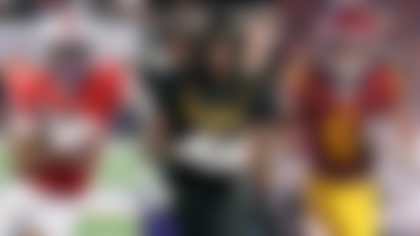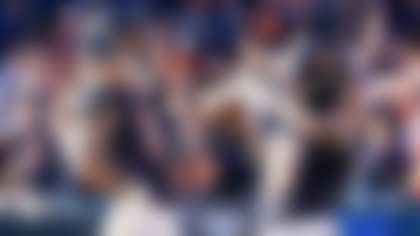A few weeks ago, one of the league's most influential owners wondered about the future of discipline in the NFL in the post-Deflategate era. The owner was supportive of Commissioner Roger Goodell and felt Goodell had done what he had to do in assessing Tom Brady and the New England Patriots harsh penalties for what the league believed was a scheme to use underinflated footballs in last season's AFC Championship Game, and then for failing to cooperate with the subsequent investigation.
But the owner was also dismayed by the protracted and bitter fight that had developed around the case. And the owner said he thought it was time for owners to consider whether the commissioner's office should have the sweeping disciplinary powers afforded it by the collective bargaining agreement.
The league had stood firm during the 2011 lockout on retaining those powers -- effectively making the commissioner judge, jury and appeals court -- and the owner said the players had given up on trying to get any of them changed rather quickly. But with several of Goodell's judgments having been overturned in a series of stinging reversals -- in the New Orleans Saints bounty case, in discipline given to Ray Rice and Adrian Peterson in their domestic-violence cases -- and with the Brady case still in federal court at the time, the owner said it might be "untenable" for the commissioner to have this much power. He said it would be a big give by the owners to cede some of it, and surely the owners would want something significant in return from players -- like, perhaps, an extension of the current CBA, which has proved very lucrative for teams -- but that it was time for owners to consider whether having all this power in one man's office was good for the league or the commissioner.
Jonathan Kraft, the president of the Patriots, said as much publicly a few days later, but Kraft had a horse in the race. The other owner did not, and after reading U.S. District Judge Richard Berman's pointed critique of the NFL's process as part of his decision to vacate Brady's four-game suspension Thursday, you have to wonder why Goodell and other owners would even want these virtually unlimited powers all to go to Goodell, when it is potentially so damaging when players and judges repeatedly try to define those limits. That is what Berman's decision Thursday tried to do. It conceded that Goodell is offered broad powers. But it said those powers have limits, most particularly limits based on the fairness of how discipline is applied.
When Goodell -- who had based his candidacy for the job on protecting "the shield" -- took office nine years ago, he made no bones about his intention to be a law-and-order commissioner. His predecessor, Paul Tagliabue, had sometimes seemed too lenient on player behavior, and Goodell was determined to clean up the image of a league that didn't want player misbehavior to tarnish the golden goose. But with rebuke after rebuke in recent years, Goodell's stature in the court of public opinion and among players has never been lower. And with the sloppy case against Brady, even owners are questioning the judgment of those closest to the commissioner.
"Am quite surprised," an owner wrote in an email after Berman's decision was released. "This will be a big blow to Roger Goodell and staff. And the lawyers who were so confident."
The Patriots and Brady were misguided in their handling of this case, too. They didn't cooperate fully with an investigation run by a league of which they are a part, with rules formulated by a process that team owner Robert Kraft was a critical part of. But the ruling makes clear that they might have been matched in their hubris by the league. When Goodell upheld Brady's suspension, one person privy to the thought process, who knew Brady would surely take the league to court, said the league felt good that even if it lost at the district court level, it was sure it would win at the appeals court.
We'll have to wait, probably many months, to see if that is true. But it's worth noting that on Monday afternoon, when Berman sent both sides home after realizing that they would never settle, the league's lawyers felt confident that the law was on their side.
"This court's decision to overturn the NFL commissioner again should signal to every NFL owner that collective bargaining is better than legal losses," NFL Players Association chief DeMaurice Smith said in a statement. "Collective bargaining is a much better process that will lead to better results."
The collective bargaining agreement does not expire for another five years, so whatever projection of what this loss means with regard to the big picture has to be tempered by time and reality. The NFL could still win the appeal, which would mean that there would be no precedent in place limiting the league's process for assessing discipline. That is important to the league, and one example as to why became evident quickly on Thursday, when a source close to Greg Hardy, the Cowboys' pass rusher who has been suspended four games for his own domestic-violence case, told NFL Media's Ian Rapoport that Hardy was planning to reconsider his appeal options in light of the Brady decision.
So the NFL will fight zealously at the appeals court to maintain Goodell's sweeping powers. For those to change permanently and peacefully, a negotiation with players would be necessary. While the disappointment in the league is deep Thursday, a lot can happen in five years, and a lot of owners' minds can change, with events still unknown. And ultimately, the players will have to give up something -- likely money in a new CBA -- to get some of the power out of the commissioner's hands.
"We will appeal today's ruling in order to uphold the collectively bargained responsibility to protect the integrity of the game," the league said in a statement after the decision. "The commissioner's responsibility to secure the competitive fairness of our game is a paramount principle, and the league and our 32 clubs will continue to pursue a path to that end. While the legal phase of this process continues, we look forward to focusing on football and the opening of the regular season."
It will open with Brady on the field, a constant, vivid reminder of the league's loss. If there was any good news for the league to be gleaned from this decision, it was that Berman did not rule on the union's claim that Goodell was an "evidently partial" arbitrator, or that he improperly delegated authority to the league's executive vice president of football operations, Troy Vincent, to impose the suspension. So Berman did not directly attack Goodell's CBA-granted power to serve as an arbitrator.
Still, exactly a week before the season opens in Foxborough, Brady and the Patriots already have scored an emotional victory. And with the ramifications for players and the future of the league, it could be the most significant victory Brady will notch all year.
Follow Judy Battista on Twitter @judybattista.












